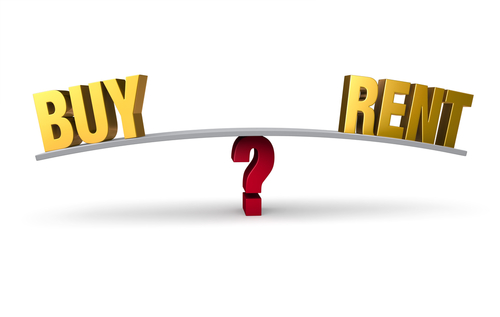Renting Vs Buying: What's Right?
For most people who can muster the down payment, buying is the better choice. But it's not a slam-dunk decision. Here's what you have to take into account when looking at renting vs. buying.

Why buy instead of rent? Are you still unsure that buying a home beats renting, even after the advice of well-known financial planning experts such as your brother-in-law and your dentist? Before you flip a coin, here’s the answer: If you're like most people, you're better off buying. To put it simply, being like most people means you'll stay put in your next home for seven years or so. Longer than that, renting becomes irrational, financially speaking. It means the numbers add up to a negative, and you'll become a loser. The longer you rent without buying, the more you will lose.
Although nearly two-thirds of the nation’s households own their own homes, it’s not the best choice for everyone. If you move a lot from city to city, or you have had credit problems, or simply can’t afford the home you like, buying instead of renting becomes less realistic. The choice can be a tough one, both financially and emotionally. Owning a home means you have to pay not just the mortgage each month, but real estate taxes, homeowner’s insurance, maintenance costs and any other incidentals that occur. From an emotional standpoint, it means you’ve agreed to establish roots in a single place with a long-term loan that for most people, lasts 30 years.
Go into the purchase knowing what it’s going to cost you, not just in the long-term but at the time of purchase as well. The closing costs can be as much as $2,000 to $5,000, depending on lawyer’s fees, points, escrow costs and other fees. That’s in addition to your down payment. You’ll have to pay at least 20% of the home’s price if you want to avoid paying private mortgage insurance, which otherwise adds another $40 to $80 to your monthly mortgage payment. If you can’t afford that much (as many first-time buyers don’t), there are many lenders who will allow you to borrow up to 95% or 97% of the price.
Curious to know how much you can afford? Try our Mortgage Calculator!
 Homeowners Gain From Sizeable Tax Benefits
Homeowners Gain From Sizeable Tax Benefits
"In the United States, Congress and the federal government have encouraged home ownership by subsidizing it for several generations. "
A mortgage gives buyers the strongest investment characteristic in terms of the advantages to buying a home. It offers leverage. But as wealth-producing as leverages can be, it always involves an increase in risk along with the possibility of reward. When home prices (or stock prices, for that matter) are falling, leverage makes losses. Borrowing most of the cost of buying in a down market means the loss you take could wipe out your ownership interest, or equity in the property you sell. Your equity is the market value of your property, less the amount you owe on it and must repay when you sell. It represents the amount of your money that's "tied up" in the property.
You can use this knowledge of leverage to your advantage. Get information from your local Realtor or Chamber of Commerce to determine how prices have risen in your area. Find out more about renting vs buying in your area, and you can even get a broker to show you appreciation levels by specific neighborhoods. Also, look at your region’s economic health. Is it growing? Are more people moving in than leaving? If so, this could lead to price appreciation that could make your home a good investment. And with the changes in the tax laws, you can keep the appreciation money tax-free as long as you live in the home at least two years. Conversely, if appreciation levels are at or near the top and the economy is showing signs of slowing or declining, a new home purchase could turn out very costly indeed.
Pros And Cons of Owning Your Home

Once you’ve bought a new house, you'll be eligible for tax benefits in the US. Mainly the largesse has come through income-tax deductions and the special treatment of some gains on the sale of residential housing. If you’re in the 31% tax bracket, owning a home with a monthly mortgage payment of about $1,500 is about the same as renting a house for $1,000.
It's a mistake, however, to think that tax breaks alone make home-buying more rational than renting. Your landlord gets many of the same deductions, and one, namely depreciation, that you don't. You may think you fail to benefit from those, but you do. You see his or her deductions in your rent. It's lower than it would have been without the tax breaks. The landlord, moreover, bears the risk of ownership, the risk that prices will fall and erode his or her equity. First-time homebuyers especially may overlook another consideration. For all the financial and emotional rewards of home ownership, it carries a heavy burden of responsibility. That's not merely maintenance or cosmetic upkeep, either, as costly as it can be.
Legal liability is a growing concern. Real estate has encouraged American litigiousness ever since colonial battles over land titles. Where there were once lines dividing property worth a few dollars an acre, there are now big-money damage claims. Those buying a home can be forced to pay compensation for a stranger's slip and fall or a tree's damage to a neighbor's roof. They can even be forced to pay for the environmental cleanup of oil or other toxins that have seeped onto their property from outside sources. Buying liability insurance isn't enough. You've got to maintain your property safely and in accordance with legal requirements to keep the insurance. Nobody can ensure you against your own criminal negligence.
Homeownership remains part of the traditional American Dream. For the first time in history, America offered ordinary people the right to own their land and their homes outright, indenturing their property to a friendly banker rather than their bodies to a feudal lord. Before you sign up for 30 years of mortgage servitude, make sure you’ve done your homework and know when to buy instead of rent, lest the dream become a nightmare.
Read more about the Hidden Costs of Buying, review the Buyer Information packet or create a list of preferences with our Buyer Wants List.

Lauren Spencer.
If you have any questions or would like more home buying & selling tips and advice, contact Lauren Spencer, Coldwell Banker Realtor at 1-831-662-6522 or Toll Free: 1-800-226-4717.
Join our site for free and you'll have exclusive access to daily updated listings, that can help you find the perfect fit and your next dream home—from the comfort of your current home!
